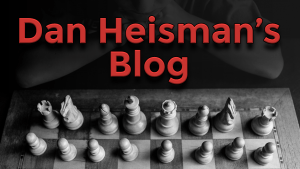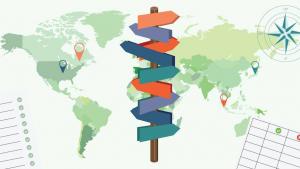Q&A with Coach Heisman May 2, 2014
Bobby Fischer played 1st board for the US in four chess Olympiads, the final one being Siegen in 1970. In 1972, after beating Spassky, the first major event he skipped (and never played again!) was that summer's Olympiad in Skopje.
Fischer also played and won in 8 US Championships, the final one in 1967-68.
I mention this because I went to spectate at two US Championship and one Olympiad. I flew to Skopje Yugoslavia but no Fischer. I went to one US Championship and then Coach Donald Byrne invited me to attend the next, but those were the first two Fischer didn't play! Amazingly, our paths never crossed, despite my going out of my way to try to see if they could - and Philadelphia and New York are only 90 miles apart!
Garry Kasparov, unlike Fischer, was not born anywhere near the US. But our paths have crossed multiple times. As just a few examples, I worked at both Kasparov-Deep Blue matches and, more recently, attended a private seminar a couple years ago that Kasparov gave on Russian politics to his guest sponsors at The University of Pennsylvania.
So I never saw the American, but have had no problem finding the Azerbaijan-born and Russian-residing Kasparov. Strange world.
This was all in answer to the question on the show "What famous chess players have you met?"
This week's show was using a new telecasting technology, and we had a few unexpected gliches at the start, but after a few minutes we were up and running as normal; hope you had a chance to stick around and get some questions answered. Because the turnout was light, I let everyone ask as many questions as they wished! 
"Why is the Italian game with 1.e4 e5 2.Nf3 Nc6 3.Bc4...
"...not considered White's best option but the Ruy Lopez 1.e4 e5 2.Nf3 Nc6 3.Bb5 is...
...when in the main line after 3...a6 4.Ba4 Black can force the white bishop onto the a2-g8 diagonal anyway after 4...b5 5.Bb3?"
Superb question! I wondered this myself when I first started playing (Similarly I wondered why the French Exchange Variation 1.e4 e6 2.exd5 exd5 was not considered all that good for White but initially the Petroff Defense with 1.e4 e5 2.Nf3 Nf6 3.Nxe5 d6 4.Nf3 Nxe4 5.d4 d5 reaching the same position as the French Exchange but with Black's knight on e4 instead of f6 was better for White?! - but that's another story).
There are three differences between the Italian position and the one in the Ruy Lopez, and they pretty much each favor White in the Ruy:
- The moves 3...a6 and 4...b5 are not fully developing moves (although they do allow for the fianchetto of the black bishop with ...Bb7) and not only create some weak squares, but allow White a timely break a2-a4 in many variations,
- The bishop on b3 is defended twice by pawns and is "loose" on c4 in the Italian Game,
- Most of all, the bishop on c4 in the Italian game is subject to the freeing advance ...d7-d5 hitting both the c4-bishop and the pawn on e4. This tactical device is useful in many Italian lines to help Black equalize, e.g. 1.e4 e5 2.Nf3 Nc6 3.Bc4 Bc5 4.c3 Nf6 5.d4 exd4 6.cxd4 Bb4+ 7.Nc3 (7.Bd2 is recommended by GM Kaufman) 7...Nxe4 8.O-O Nxc3 9.bxc3 d5!
"Should you mostly study what is fun?"
Yes! Chess is a hobby and if you study what is not fun just to get better you not only will get diminishing returns, but your hobby will suffer. For many players only certain types of study is fun. Luckily for me, I enjoyed almost all types of study: puzzles, annotated games, "talky" books, etc. For more of the role of fun in your chess study, check out "Chess, Learning, and Fun".
"Will Chess.com allow 45 45?"
Chess.com allows pretty much any time limit already. Once you log on Chess.com Live, turn down the automatic game offer, find a friend, and challenge him/her to any time limit you wish (within reason). The real issue is whether Chess.com will offer "automatic" game-pairings when you log on that are slower than 30 0. I am told they will eventually add at least one slower option (as well as time-stamping in review of the game!), so let's hope it's sooner rather than later 
The next show will be May 16. Mark it on your calendar and bring some interesting questions. See you there!






